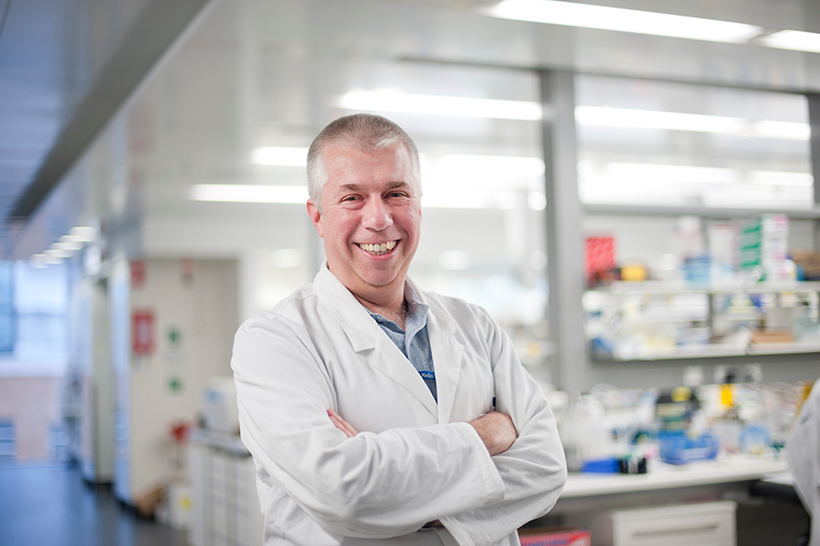Prof. Stephen Nutt: Therapeutic targeting of IRF4 to treat multiple myeloma

Multiple myeloma (MM) is a cancer characterised by overgrowth of a white blood cell called plasma cells that form in the bone marrow. This aberrant growth depends on a regulatory protein called IRF4. Prof Nutt will employ a novel approach to identify and test drugs that can inhibit IRF4 and block the growth of MM cells.
Multiple myeloma (MM) is a form of cancer that arises from altered plasma cells whose number can no longer be appropriately controlled and is one of the most common blood cancers. Plasma cells are a specialized cell type that produce the antibodies that are essential to protect us from microorganisms and provide the basis for the beneficial effects of immunization. Despite considerable advances in treatments options in recent years, MM remains incurable.
Work from a number of researchers has identified a regulatory protein called IRF4 as being essential for MM cell survival. Recent data supports the idea that inhibiting IRF4 function represents an exciting approach for the effective treatment of MM. Prof Nutt’s laboratory have developed a new experimental system to probe the IRF4 molecule to identify new areas of weakness and aim to translate this knowledge into anti-IRF4 drugs that can be rapidly developed into new potential treatments for MM.
About Stephen
Stephen completed his PhD research at the Research Institute of Molecular Pathology, Vienna Austria, where identified the key role played by Pax5 in B cell biology. In 2001 he moved to the Immunology Division of the Walter and Eliza Hall Institute to establish a research program focussing on lymphocyte differentiation. In 2016, he was elected as a Fellow of the Australian Academy of Science and is a Professor at the University of Melbourne.
Throughout his career Dr Nutt has been intrigued the regulatory logic used by immune cells in making cell fate decisions and particularly how a select group of transcription factors act as the master regulators to program the immune response. Deregulated expression and function of many of these master regulators results in human diseases including autoimmunity and blood cell cancers. Dr Nutt’s research is particularly focused on identifying the factors controlling the survival of multiple myeloma cells, an incurable malignancy of antibody producing plasma cells.
This research project is kindly supported through the Estate of Davina Sickerdick.
Last updated on January 30th, 2023
Developed by the Leukaemia Foundation in consultation with people living with a blood cancer, Leukaemia Foundation support staff, haematology nursing staff and/or Australian clinical haematologists. This content is provided for information purposes only and we urge you to always seek advice from a registered health care professional for diagnosis, treatment and answers to your medical questions, including the suitability of a particular therapy, service, product or treatment in your circumstances. The Leukaemia Foundation shall not bear any liability for any person relying on the materials contained on this website.